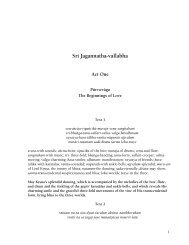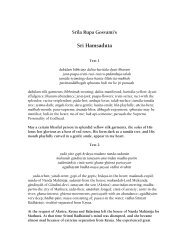Srimad Bhagavatam, Volume 3
Srimad Bhagavatam, Volume 3
Srimad Bhagavatam, Volume 3
Create successful ePaper yourself
Turn your PDF publications into a flip-book with our unique Google optimized e-Paper software.
Nirahamkarah—unattached, Samcchinna—perfectly cut off,<br />
Asesavandhanah—unlimited attachment.<br />
Maharaj at once relinquished all his garment belt and ornaments of a<br />
royal order and became completely uninterested unattached to all sorts of<br />
attachment.<br />
To become purified of material contamination is the necessary qualification<br />
for becoming one of the associates of the Lord. No body can become an<br />
associate of the Load or can go back to home back to Godhead without such<br />
purification. Maharaj Yudhisthir, therefore, to become spiritually pure at once<br />
gave up his royal opulence by dress and garments. The kashaya or saffron<br />
loins of a Sanyasi means free from all attractive material garments and thus he<br />
changed his dress accordingly. He became uninterested to his kingdom and<br />
family attachment and thus became free from all material contamination or<br />
material designation. People are generally attached to various kinds of<br />
designations namely the designation of family, society, country, occupation,<br />
wealth, position and so many others. So long one is attached to such<br />
designations he is considered materially impure. The so called leaders of men<br />
of the modern age are attached by natinal consciousness but they do not know<br />
that such false consciousness is also another designation of the materially<br />
conditioned soul; and one has to relinquish such designations before one can<br />
become elligible for going back to home back to Godhead. Foolish people,<br />
howover adore such men who die in national consciousness but here is an<br />
example by a royal order like Maharaj Yudhisthir who prepared himself for<br />
leaving this world with out such national consciousness. And yet he is<br />
remembered by all men even up to date because he was a great pious king<br />
almost on the same level of the Personality of Godhead Sri Rama. And<br />
because people of the world were dominated by such pious kings, they were<br />
happy in all respects and it was quite possible for such great emperors to rule<br />
over the world.<br />
Vacham juhava manasi tatprana itarecha tam<br />
Mrityavapanam sotsargam tam panchatwe hi ajohobit.<br />
Vacham—speeches, Juhava—relinquished, Manasi—unto the mind,<br />
Tatprana—mind into breathing, Itarecha—other senses also, Tam—unto that,<br />
Mrityau—unto death, Apanam—breathing, Sotsargam—with all dedication,<br />
Tam—that, Panchatwa—unto the body made of five elements, Hi—certainly,<br />
Ajohabit—made it amalgamated.<br />
Thus he amalgamated all the organs of senses in to the mind, then mind<br />
into life, life into breathing, the total existence into the embodiment of<br />
five elements and body unto the death and as pure self, he was free from<br />
material conception of life.<br />
Maharaj Yudhisthira also exactly like his brother Arjuna began to concentrate<br />
in himself gradually being freed from all matarial bondage as they are<br />
performed by mystic performances. First of all he concentrated all actions of<br />
the senses amalgamated in the mind or in other words he turned his mind<br />
towards transcenden tal service of the Lord. He prayed to mind that all<br />
material activities were performed by the mind the action and reactions of the<br />
material senses and since he was going back to home and back to Godhead the<br />
mind may wind up its material activities and be turned towards the<br />
transcendental service of the Lord. There was no more necessity of material<br />
activities. Actually the activities of the mind cannot be stopped because it is<br />
the reflection of the eternal soul but the quality of the activities can be<br />
changed from matter to transcendental service of the Lord. The material<br />
colour of the mind is changed by washing it off from the contamination of<br />
life-breathing and thereby getting it freed from the cantamination of repetition<br />
of birth and death being situated in pure spiritual life. The whole thing is<br />
manifested by the temporary embodiment of material body which is a<br />
production of mind at the time of death and if the mind is purified by pracice<br />
of transcendental loving service of the Lord, and the same is constantly<br />
engaged in the service of the Lotus Feet of the Lord. there is no more any<br />
chance of the mind's producing another material body after death, but being<br />
freed from the absorption of material contamination the pure soul is able to<br />
retun back to home back to Godhead.<br />
Tritwe hutwa cha panchatwam tat cha ekatwe juhot munih<br />
Sarvam atmani ajuhobit brahmani atmanam avyaye.<br />
Tritwe—unto the trio qualities, hutwa—having offered, Cha—also,<br />
Panchtwam—five elements, Tat—that, Cha—also, Ekatwe—in one nescience,<br />
Juhot—amalgamated, Munih—the thoughtful, Sarvam—the Sumtotal,<br />
Atmani—in the Soul, Ajuhobit—fixed up, Brahmani—unto the spirit,<br />
Avyaye—unto the inexhaustible.<br />
Thus conceiving annihlation of the gross body of five elements in the<br />
three qualitative modes of material nature merged them in one nescience<br />
and then again he absorbed nescience in self Brahman which is<br />
inexhaustible at all circumstances.<br />
All that we have manifested in the material world are different production of<br />
the Mahat Tattwa Avydkta and things that are visible in our material vision<br />
are nothing but combination and permutation of such variegated material<br />
31<br />
Fifteenth Chapter - The Pandavas Retire Timely<br />
products. But the living entity is different from such material products. It is<br />
due to the forgetfulness of the living entity of his eternal nature as eternal<br />
servitor of the Lord and on account of his false conception of becoming a so<br />
called Lord of the material nature, that he is obliged to enter into existence of<br />
false sense enjoyment and a concommitant generation of material energy are<br />
two principal causes of the mind being materially affected and thus the gross<br />
body of five elements produced. Maharaj Yudhisthir thus reverted the action<br />
that he merged the five elements of the body in the three modes of material<br />
nature. The qualitative distinction of the body as being good, bad or via media<br />
thus extinguished and again such qualitative manifestations also became<br />
merged in material energy which was produced from a false sense of the pure<br />
living being. When one is thus inclined to become an associate of the<br />
Supreme Lord the Personality of Godhead in one of the innumerable planets<br />
of the spiritual sky specially in Goloka Vrindaban, one has to think always<br />
that he is different from the material energy, he has nothing to do with them<br />
and he has to pose himself as pure spirit or Brahman qualitatively equal with<br />
the Supreme Brahman (Parameswara). Maharaj Yudhisthir after distributiug<br />
his kingdom to Parikhit and Vajra thought himself not the emperor of the<br />
world or the head of the Kurudynasty. This sense of freedom from material<br />
relations as well as getting free from material encagement of the gross and<br />
subtle encirclement makes one free to act as the servitor of the Lord even<br />
though one is in the material world and this stage is called Jivanmukta stage<br />
or the liberated stage while remaining even in the material world. That is the<br />
process of ending material existence not only by thinking that he is Brahman,<br />
but also by acting like Brahman. One who thinks only as Brahman is the<br />
impersonalist. And one who acts like a Brahman is the pure devotee.<br />
Cheeravasa niraharo baddhabang muktamurdhajah<br />
Darshayan atmano rupam jada unmatta pisachavat<br />
Anapekshamano niragad asrinwan badhirayatha.<br />
Cheeravasa—accepted torn clothings, Niraharo—gave up all solid foodstuff,<br />
Baddhavang—stopped talking, Muktamurdhajah—unlocked the bunch of<br />
hairs, Darshayan—began to show, Atmano—of himself, Rupam—feature of<br />
the body, Jada—inert, Unmatta—mad, Pisachaavat—just like an urchin,<br />
Anabekshamana—without waiting for, Asrinwan—without hearing,<br />
Badhira—just like a deaf, yatha—as if.<br />
After that Maharaj Yudhisthir dressed himself by torn clothings gave up<br />
eating of all solid foodstuff, voluntarily became dumb and unlocked his<br />
bunch of hairs. All these combined he was seen just like an urchin mad<br />
man without any activity. He did not any more depend for anything upon<br />
his brothers neither did he hear anything just like a deafman.<br />
Thus being freed from all external affairs he had nothing to do with imperial<br />
or family prestige and for all practical purposes he posed himself exactly like<br />
an inert mad urchin without any talkativeness in terms of material affairs.<br />
Neither he had any kind of dependence upon his brothers who had all along<br />
been helping hand to him. This stage of complete independence of everything<br />
is also called the purified stage of fearlessness.<br />
Udichim pravibesasam gatapurvam mahatamabhih<br />
Hridi Brahman param dhyanna avarteta yato gatah.<br />
Udichim—the northern side, Pravibesasam—those wh o wanted to enter<br />
there, Gatapurvam—the path accepted by his forefathers, Mahatmabhi—by<br />
the broad minded, Hridi—within the heart, Brahman—the Supreme, Param—<br />
Godhead, Dhyayan—constantly thinking of, Barteta—passed days, Yato—<br />
wherever, Gatah—went.<br />
He then started towards the northern side the path which was accepted<br />
by his forefathers and great man just to devote himself completely in the<br />
thought of the Supreme Personality of Godhead. And he lived in that way<br />
wherever he went.<br />
It is understood from this verse that Maharaj Yudhisthir followed the foot<br />
prints of his forefathers and the great devotees of the Lord. We have discussed<br />
many times before, the system of Varnashram Dharma, as it was strictly<br />
followed by the inhabitants of the world, specifically by those who inhabited<br />
the Aryavarta province of the world, emphasises on the very important point<br />
of leaving all household connection at a certain stage of life. The training and<br />
education was so imparted and as such a respectable person like Maharaj<br />
Yudhisthir must would have left all family connection for self realisation and<br />
going back to home going back to Godhead. No king or respactable<br />
gentleman would continue family affected life till the end because that was<br />
considered suicidal and against the interest of perfection of human life. In<br />
order to be free from all family encumbrances and devote oneself cent per<br />
cent in the devot ional service of the Lord Krishna this system is ever<br />
recommended for every one because that is the path of authority. The Lord<br />
instructs in the Bhagwat Geeta (Bg. 18.62) that one must become a devotee of<br />
the Lord at least at the last stage of one's life and one sincere soul like that of<br />
Maharaj Yudhisthir must abide this instruction of the Lord for his own<br />
interest.<br />
The specific words Brahman Param means Lord Sri Krishna. This is<br />
corroborated in the Bhagwat Geeta (Bg. 10.12) by Arjuna with reference to












